Clashes Between Taliban and Iranian Border Guards Kill at Least 3
Heavy gunfire was reported on the Afghan-Iranian border on Saturday between the Taliban and Iranian border guards, killing at least two Iranians and one Taliban fighter. Both sides blamed the other for initiating the clash.

Facts
- Heavy gunfire was reported on the Afghan-Iranian border on Saturday between the Taliban and Iranian border guards, killing at least two Iranians and one Taliban fighter. Both sides blamed the other for initiating the clash.1
- Reports indicated that the fighting ended by Sunday, with relative calm returning to the Sasuli border post, where the clash took place, in Iran's Sistan and Baluchestan province which borders the Afghan province of Nimroz.2
- Abdul Nafi Takor, a spokesman for the Afghan Interior Ministry, claimed that Iran started the clash, adding that “the situation is under control now." Iran's deputy police chief, Gen. Qasem Rezaei, condemned the “unprovoked attack,” with the Iranian official media saying that Tehran inflicted “significant damage and casualties.”3
- The clash is thought to be part of an escalating dispute between Iran and Afghanistan regarding water rights, as earlier this month Iranian Pres. Ebrahim Raisi warned Kabul "to immediately give the people of Sistan-Baluchistan their water rights.”4
- The source of dispute is the Helmand River, which flows from Afghanistan into Iran and is more than 1K kilometers long. Crisis-stricken Afghanistan seeks to dam the river to generate electricity and irrigate agricultural land. This would decrease flow into Iran, which has experienced worsening droughts in the last decade.5
- Iran claims that by damming the Helmand River, Afghanistan violates a water-sharing treaty signed by the two countries in 1973. Iran and the Taliban have had strained relations, with Iran maintaining its embassy in Kabul but not recognizing the new Taliban government.2
Sources: 1Associated Press, 2VOA, 3Arab News, 4The Times of Israel, and 5Al Jazeera.
Narratives
- Anti-Iran narrative, as provided by The New Arab. The Taliban has been very transparent that it does not seek war with Iran. Neither country can afford to go to war, and diplomacy must prevail. Both countries have legitimate concerns regarding the Helmand River, and hopefully, an effective solution can be reached through mediated negotiations with Tehran being receptive.
- Pro-Iran narrative, as provided by PressTV. Iran will not stand for this aggression on its borders. The Islamic Republic's leadership has been clear that it will not allow Afghanistan, regardless of who's in power, to subvert past agreements and compromise Iran's water rights. Tehran will act with restraint, but it's willing to react with more aggression if necessary.






